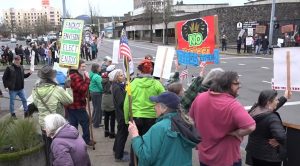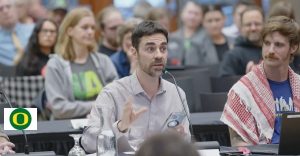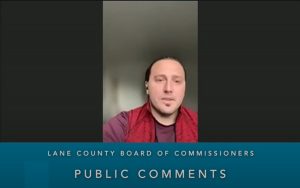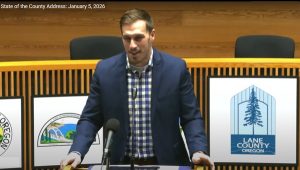Think globally, act locally: Thacker Pass
4 min read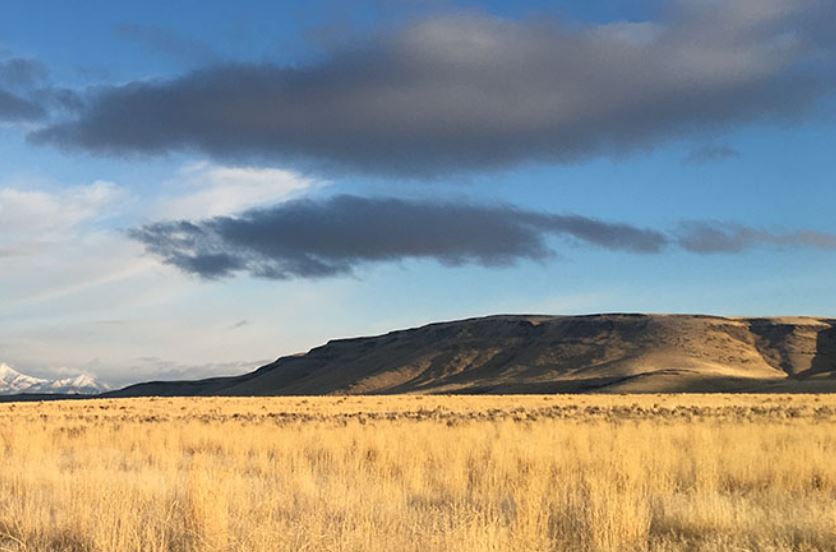
[00:00:00] Jenah’Eve Hartman: Hi, this is Jenah and I’m here today to think globally and act locally. Civilians are being killed in Ukraine. Civilians are also being killed right here in Oregon, along the Oregon-Nevada border. Mining companies are poised to wipe out the Native populations.
[00:00:15] Auntie Muffy went to Thacker Pass and visited the people there. This is what she told us.
[00:00:21] ‘The situation at Winnemucca is particularly scary. Many of its people were afraid to talk to us, or they didn’t want their names revealed. One elder woman told us, We cannot go on like this.
[00:00:34] ‘The Bureau of Indian Affairs is leveling their territory, ejecting more than 500 people, and making room for a man camp to house construction workers.
[00:00:43] ‘We all know where that will lead—a new epidemic of missing and murdered Native women and people.
[00:00:48] ‘It’s also bad in surrounding communities. At the Fort McDermitt Tribal Nation, whose people are closely related to Winnemucca’s, they have the second-highest violent crime rate out of all 576 Tribes in the U.S. The BIA is in charge of law enforcement, but the people are suffering at the hands of a constant stream of new rookie officers.
[00:01:12] ‘Community elders are subject to routine violence, and most people carry loaded weapons. Many Fort McDermitt youth have been killed by BIA cops.
[00:01:23] ‘From what I saw, I believe it’s possible that neither Winnemucca nor Fort McDermitt will even exist as communities in a year from now.’
[00:01:32] That is what Aunt Muffy told us.
[00:01:33] The sulfuric acid used in strip mining for lithium will poison the waters for the next 300 years.
[00:01:40] They call that an ‘externality.’ Here’s John Hadder of Great Basin Resource Watch.
[00:01:46] John Hadder: It’s going to be a source of water pollution for at least 300 years.
[00:01:50] And they’re going to have to capture it and they’re going to have to treat it. Right now the Bureau of Land Management is not requiring a reclamation bond—so, financial assurances that go out to 300 years or so. By the mining company’s own analysis, there’s going to be contamination that they’re probably going to have to capture and treat for at least 300 years. So how come you’re not bonding for that?
[00:02:15] They’re trying to run over some things quickly, air quality issues that have come up as well. We did comment on the emissions issue with sulfur dioxide in particular. Their plan is to double from phase one to phase two, they’re going to double production of sulfuric acid. They’re going to burn twice as much sulfur, and yet their emissions barely go up at all. So what’s that all about? They claim to have, ‘Oh yeah, this company has technology that’s going to do it,’ but it’s not in the Environmental Impact Statement. They’re actually not supplying data. What I found out later is, if in fact they can’t keep the emissions as low as they think they can, they would have to get a Class One Air Quality permit versus a Class Two and a Class One takes an entire another year to permit.
[00:02:57] Daranda Hinkey: My name’s Daranda Hinkey. I am a Fort McDermitt Tribal Member up in Northern Nevada. I’m also part of the People of Red Mountain Committee, or Atsa koodakuh wyh Nuwu.
[00:03:10] You know, we cannot save our Earth by destroying it. And it’s just as simple as that. We see how contamination of water and land and air, how that hurts culturally from a tribal perspective. And the amount of water that the EIS is telling us that this lithium mine is going to take is 1.7 billion gallons of water per year. And to anybody that has lived in this place, or just lives in a place where water is really precious, there is a drought, there’s been a continuous drought. And so on top of that, they want to take that much water from this beautiful area.
[00:03:48] It’s not okay. And it’s going to be a destruction and a cultural genocide of The People if you take this much water, because not only are you taking water for the human aspect, but you’re taking water from the animals that we go and hunt, you’re going to take away the water for the plants and the medicines and the first foods that we go and gather.
[00:04:08] …It’s not just this one thing, it’s multiple things. Reconnecting with this land and the language and everything else that goes along with it gives The People a purpose.
[00:04:19] Jenah’Eve Hartman: This lithium mine was fast-tracked for approval. They’re starting to destroy Native communities. Then they will poison the water and complete their genocide. We can stop the genocide here on Thacker Pass. On YouTube, search for ‘People of Red Mountain’ and ‘Daranda Hinkey’ and see what you can do to help right here in Oregon
[00:04:38] Here to think globally and act locally, I’m Jenah for KEPW 97.3, Eugene’s Peace Works Radio.
Ask the Secretary of the Interior to revoke the Thacker Pass permits: https://action.lakotalaw.org/action/protect-thacker-pass-haaland-grijalva
